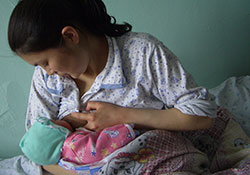Breastfeeding mothers need peer counselling

WHO/Alberta Bacci
The WHO European Region has one of the lowest average proportions in the world of children exclusively breastfed at 6 months of age. Strong evidence shows that exclusive breastfeeding is the natural and most efficient method to ensure optimal child growth and development.
The theme of World Breastfeeding Week (1–7 August 2013) is supporting mothers through peer counselling. Although mothers may begin well, breastfeeding rates decline sharply over time. The proportion of children exclusively breastfed at 3 months of age was 50% or less in 24 out of 36 countries in the European Region that participated in national surveys in 2005–2010. Only in 1 country in the Region were more than 50% of 6-month-olds exclusively breastfed.
Role of community support
When mothers visit health care facilities less frequently, community support systems become essential to sustain breastfeeding. Traditionally, support comes from the family, but increasing urbanization leads to the extension of support systems to include friends, employers, trained health workers, lactation consultants and community leaders. They can help in some of the following ways:
- Fathers can reduce stress for mothers by doing household chores or taking care of babies (providing baths, diaper changes, walks, etc.).
- Children and members of the extended family can provide emotional support and practical household help.
- Employers can provide maternity leave, and breastfeeding areas and milk storage space in workplaces.
- Health workers can provide peer counsellors on breastfeeding to help new mothers deal with concerns such as milk shortages or nipple pain.
Since breastfeeding is important for both maternal and infant health, WHO recommends that mothers start it within 1 hour of birth and breastfeed exclusively for infants' first 6 months, to achieve optimal growth, development and health. In addition, timely introduction of complementary foods should occur after 6 months of age, and breastfeeding should continue up to or beyond 2 years of age.
Benefits for breastfeeding mothers
Exclusive breastfeeding benefits mothers as it acts as a natural birth-control method, providing up to 98% protection in the first 6 months after birth. It also helps women lose their pregnancy weight more easily and reduces obesity rates. Research also suggests that women who breastfeed are less likely to develop breast and ovarian cancer, and have lower risks of osteoporosis and coronary heart disease.
Women often stop breastfeeding because they need to return to the workplace. Global comparative analysis suggests that larger percentages of women practise exclusive breastfeeding in countries where laws guarantee breastfeeding breaks at work. Thus, workplace policies are essential to help mothers sustain breastfeeding.
Reducing infant mortality
Breast-milk provides infants with not only nutrients for healthy development but also antibodies to combat illnesses such as diarrhoea and pneumonia, two main causes of child mortality. Infant formula does not provide this immunity.
Every year, more than 155 000 children in the European Region die before the age of 5, with 19% dying from pneumonia or diarrhoea. In April 2013, WHO and the United Nations Children's Fund (UNICEF) launched the integrated Global Action Plan for the Prevention and Control of Pneumonia and Diarrhoea, calling for better integration of efforts for prevention and treatment. Since breastfeeding benefits infants' immune systems, increasing rates would help to achieve the Action Plan's goal of reducing infant mortality.
WHO efforts
On 5 July 2013, European Member States signed the Vienna Declaration on Nutrition and Noncommunicable Diseases in the Context of Health 2020. Its policies to improve diets throughout life include adequate support and promotion of breastfeeding.
In 1992, WHO and UNICEF launched the Baby-friendly Hospital Initiative (BFHI) to provide support and improve care for mothers and newborn babies. BFHI has led to baby-friendly facilities in more than 150 countries worldwide. In 2002, WHO Member States endorsed the global strategy for infant and young child feeding, as a guide for action. One of its objectives is to create environments that enable mothers, other family members and other caregivers to make and implement informed choices on optimal feeding practices for infants.
In May 2012, WHO's Member States gave the global strategy a further boost by endorsing a comprehensive implementation plan for maternal, infant and young child nutrition. One of the plan's six targets is for at least 50% of babies aged under 6 months to be exclusively breastfed by 2025. Analysing the barriers and developing action plans to overcome them are the only ways forward.



